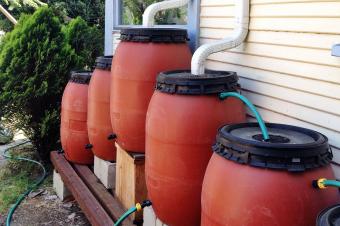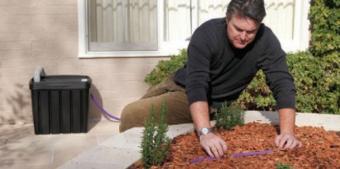
Many people aren't aware of the economic advantages that household wastewater recycling systems offer. Every time faucets are turned on and toilets are flushed, precious water is wasted. For those concerned about the environment, reusing wastewater is an important issue right alongside recycling or composting paper, leaves and grass, and plastics.
Wastewater Recycling Systems
There are many different types of systems for reclaiming household wastewater, known as greywater. Greywater makes up 60 percent of the household waste water. The impact from reusing greywater is best explained by The California Coast Keeper Alliance that states, "Recycled water could meet nearly one-third of California's water supply needs."
Greywater State Laws
Reusing or redistributing greywater for certain uses is illegal in some states. It's important to know how greywater is classified for your region. A prime example of why you should check current laws in your state is North Carolina wastewater laws. The state laws once prevented the use of greywater. In fact, water from showers, tubs, and bathroom sinks was classified as sewage. However in 2014, North Carolina wastewater laws changed to encourage the use of reclaimed and recycled water.
Greywater Filtration Systems
Greywater filtration systems utilize a series of filters within a reservoir to filter out particulate matters from your wastewater. These systems can be used in conjunction with your washing machine, shower/tub, or bathroom sinks to help ensure the quality of your greywater. Filtered systems are often more expensive than non-filtered systems; however, they have a broader range of uses, such as redistributing filtered water to your garden or yard. Flotender Greywater Irrigation Systems recommends using an irrigation drip system to deliver the filtered greywater to landscaping plants.
Unfiltered Greywater Pump Systems

Unfiltered pump systems are the most common greywater recycling systems used in homes across the developed world. These can be utilized in a number of different ways. This is only advised when you commonly use organic biodegradable soaps, detergents, and shampoos that don't contain any chemical dyes or perfumes.
- You can attach this type of system to the outgoing plumbing of bathroom sinks and hooked up to the intake of your toilet. When you use your sink, the greywater enters a reservoir. The pump sends the water back into your toilet tank when it refills.
- An unfiltered greywater pump system can also be connected to reuse the greywater from your bathtub, sinks, and showers to irrigate your yard or garden However, you cannot connect an automatic irrigation system since the accumulation of hair, skin, and other organic matter can easily clog an unfiltered system.
- Unfiltered pumps are not well-suited for use with outdoor systems, such as rain barrels, since these can easily clog from sediment build-up.
- When using an unfiltered system to reuse water from the washing machine, lint can clog the pump.
- Unfiltered water cannot be used in a drip irrigation system since it can easily clog.
Passive Greywater Systems
There are many kinds of passive recycling systems you can use.
- A bucket in the shower can collect water and be used to flush the toilet. This doesn't require any modifications or installations of pumps. Just pour the water into the toilet bowl and it'll force the toilet to flush.
- Shower water collected in a bucket can also be used for large plants, such as trees or shrubbery, as long as you're using non-chemical biodegradable products.
- A toilet tank sink is a great passive greywater system that allows you to wash your hands and the water to fill up the toilet tank for the next flush.
Custom Greywater Systems
Custom systems are an option if you're willing to spend a little extra money to purchase a specialized system built into your home. A customized system can accomplish different things depending on your budget and needs.
- Customized water reusable systems can specify where wastewater goes.
- You can link a filtered greywater system to your irrigation systems by a timer and even monitor the amount of water you're reusing.
Buying a Wastewater System

Wastewater reuse has been rising in popularity at a steady pace. This has created a market for wastewater recycling products that provide a large assortment of products.
Aqua2Use Greywater Recycling System
The Aqua2Use system is designed to be used in a broad assortment of ways. You can use it outdoors in conjunction with a rain barrel or in your home to recycle bathtub, shower, washing machine, and bathroom sinks wastewater. It uses a series of filters to remove various sizes of contaminants until you are left with particulate-free water. It is fully automated and uses sensors to tell when the water level in the reservoir is high enough to require pumping.
SinkTwice Toilet Tank Greywater System

SinkTwice is a toilet tank cover that features a faucet and sink combo. This system replaces the toilet tank lid and connects directly to the tank valve to redirect the clean water coming into the toilet tank. The water emits from the faucet automatically whenever you flush the toilet. You can wash your hands in the clean water that is then carried to the toilet tank. The faucet automatically turns off when the refill cycle is complete.
Saniflo 008 SANIVITE Gray Heavy Duty Water Pump
The Saniflo 008 is designed to integrate easily with a variety of home water wasters. It can be integrated with your sink and easily adapted to pump water out to a rain barrel or to an irrigation system. It is not recommended that you hook this up to a washing machine since the amount of water used by most washing machines comes out too fast for the pump to handle.
Choosing to Recycle Wastewater
Reusing wastewater carries with it many benefits. It is important to learn the local laws governing the use of wastewater in your area before investing hundreds or thousands of dollars into a wastewater recycling system you can't even legally use. If you are able to use one, a wastewater recycling system is a simple way to conserve water and lower your water bill.







